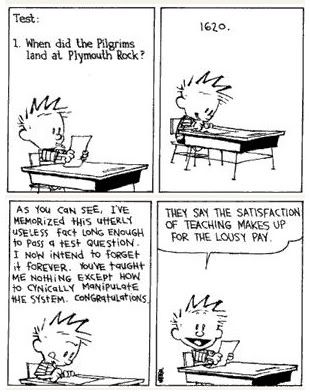 The problem lies in the fact that public education was conceived, planned and structured around the intellectual ideas of the Enlightenment and the economic format of the Industrial Age. And so now even a traditional school is built around the idea of a factory. Bells regulating time, lockers, the works. But it's not the only outcome. We also arrange kids in batches of age, as if the most relevant thing pertaining to education that kids have in common is when they where born. A horrible miscalculation. Not to mention the gross defilement of any Arts programs in public schools. As if the only thing kids need to be happy is to have textbooks worth of facts on science and math and english crammed down their throats.
The problem lies in the fact that public education was conceived, planned and structured around the intellectual ideas of the Enlightenment and the economic format of the Industrial Age. And so now even a traditional school is built around the idea of a factory. Bells regulating time, lockers, the works. But it's not the only outcome. We also arrange kids in batches of age, as if the most relevant thing pertaining to education that kids have in common is when they where born. A horrible miscalculation. Not to mention the gross defilement of any Arts programs in public schools. As if the only thing kids need to be happy is to have textbooks worth of facts on science and math and english crammed down their throats.
Oh, but wait, there's more! You need to sit still, pay attention. Answer these questions using the proper methods. There is only one right way to do it, and the answer is in the back of the book. And no collaboration. Let me repeat that; "NO COLLABORATION." Aren't schools supposed to teach you useful, real-world knowledge? And if that is true (or I'm merely riding on a idealist delusion), then shouldn't we be able to work in groups on almost everything? You're not going to be working alone all the time when you're in the real work force. Trying to evaluate students differently is like trying to determine the he health of the entire hive from just one bee.
Now, there are exceptions. There are enough people who fit into this mold, who are "smarter", to keep the delusion going. If that kid could make it so far, then everybody can make it that far, and anyone who does't excel in the same field, at the same pace, with the same proficiency is simply lazy. You could waste artistic genius simply because they weren't exemplary in the sciences. At that point, who cares? Artistic genius! But no, sit down, pick up your pencil, and neatly bubble in and answer, and no talking.
No comments:
Post a Comment